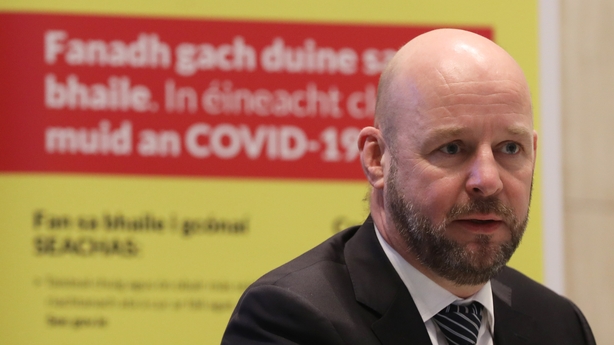Ireland is moving "rapidly towards the point at which the cautious and phased reopening of education would be feasible", according to the chair of the NPHET's Epidemiological Modelling Advisory Group.
Professor Philip Nolan said the country could reach between 200 and 400 new cases of Covid-19 per day by the end of February.
He said that in such a scenario, certain "high priority and low risk" opening-up could happen without a significant increase in transmission of the virus, including in education and other priority areas of the 'Living with Covid' plan.
Speaking on RTÉ's This Week, Prof Nolan said that by 5 March, Ireland will be in a "a much better place, but a place in which we need to be cautious".

The Government confirmed on Tuesday that the current Level 5 restrictions would be extended until 5 March with a view to crushing the numbers of those contracting the disease, and in turn the numbers needing hospitalisation and intensive care.
Prof Nolan said the country is coming off a very large wave of the disease, and that the last four weeks have shown that the basic public health measures work against the new Covid-19 variant, "but you just have to work harder at it".
He said he is optimistic about avoiding another surge of infections in the spring and early summer, as people will have learned from what happened in December.
Speaking on the same programme, Taoiseach Micheál Martin said he "does not see a major reopening of the economy" on 5 March and that the Government would take a "conservative and cautious" approach to reducing restrictions.
Mr Martin said the prolonged suppression of the virus would see primary schools reopened on phased basis and construction reopening once cases dropped below 1,000 a day.
Mr Martin said it is hoped that special schools could reopen first, but said the hospitality sector could not reopen before an increased roll-out of the vaccine project.
He said that the roll-out of the vaccine programme depends on the supply of doses, but the intention is to vaccinate all people aged over 70 by March and a significant number of the population by the autumn.
Mr Martin said that while these are current targets, the Government needs to be careful about giving precise commitments around vaccines, as it depends on external factors around manufacture and supply.
He said that "the vaccines do offer us good hope and I understand the impatience that is out there... but we don't control the external environment around the manufacture of the vaccine".
The Taoiseach said that Ireland is down 300,000 doses that were expected from AstraZeneca and "we may pick it up again", but now will have 1.1m instead of 1.4m vaccines [from Astrazeneca].
He also said that the vaccine programme will pick up in May, June and July as increased supplies come in from Pfizer and Moderna and hopefully Johnson & Johnson.
Mr Martin said discussions between the Government and Northern Ireland's First and Deputy First Ministers about a Covid-19 strategy has led to an alignment in policies in all areas except travel.
He also said that some clarity will be given this week on the Leaving Certificate situation to reduce stress and anxiety for students and their parents.
He said that a Cabinet sub-committee will consider proposals from Minister for Education Norma Foley in relation to this year's exams.

